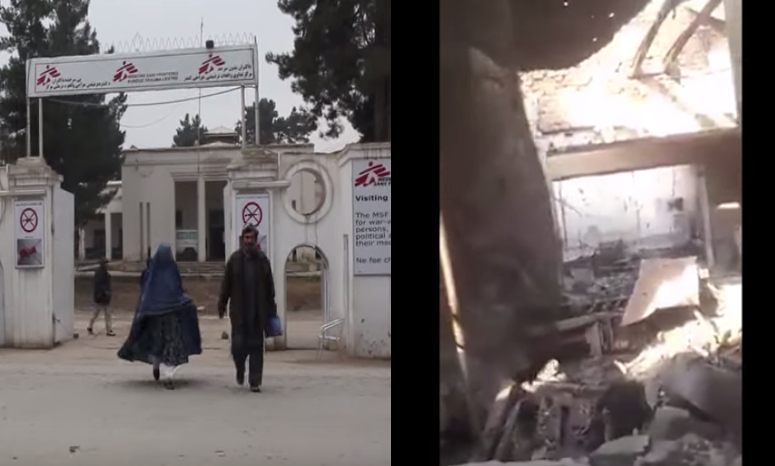'Before And After' Footage Portrays Destruction Of MSF Hospital By U.S Bombs
Before And After: MSF Hospital In Kunduz
NEW DELHI: Charity Médecins Sans Frontières (Doctors Without Borders), whose hospital in conflict-torn Kunduz was bombed by a United States airstrike earlier in the week, has released footage showing the extend of the devastation.
In the bombing, at least 22 MSF staff and ten patients -- who were seeking medical treatment as the Taliban captured the city of Kunduz -- were killed. On a video posted to its YouTube channel, MSF commented:
“This is footage taken at the Doctors Without Borders/Médecins Sans Frontières (MSF) trauma hospital in Kunduz, Afghanistan, in 2011, 2014 and 2015. The hospital was the only facility of its kind in the northeastern region of the country. It provided cost-free, high level life- and limb-saving trauma care. In 2014, more than 22,000 patients received care at the hospital and more than 5,900 surgeries were performed. MSF treats all people according to their medical needs and does not make any distinctions based on a patient’s ethnicity, religious beliefs or political affiliation.
At the time of the aerial attack on October 3, there were 105 patients and their caretakers in the hospital, alongside more than 80 international and Afghan MSF staff. MSF expresses its sincere condolences to the families and friends of its staff members and patients who have tragically lost their lives in this attack.
MSF calls for State activation of the International Humanitarian Fact-Finding Commission to investigate Afghanistan bombing. Read more: http://bit.ly/1hr5390.”
A majority of the four minute video shows medical staff providing treatment at the well-equipped facility. The last few seconds of the video shows the destruction caused by the US airstrike. It is not known whether any of the people featured in the video were victims of the strike, in which doctors and patients burnt to death.
At the time of the attack, 105 patients and their caretakers were inside, as well as than 80 MSF staff, MSF said.
The US, on its part, has put forth conflicting positions on the strike. In the latest developments, US commander General John Campbell conceded that the strike was called by US special operations forces and not their Afghan allies, as previously alleged.
On Saturday, Campbell had given a different version of events. The General said that Afghan forces had requested US air cover after being engaged in a “tenacious fight” to retake the northern city of Kunduz from the Taliban.
On Monday at a press conference, Campbell did a volte face and said that Afghan forces had not directly communicated with the US pilots of an AC-130 gunship overhead.
Then on Tuesday, Campbell told the Senate armed services committee that “Even though the Afghans request that support, it still has to go through a rigorous US procedure to enable fires to go on the ground. We had a special operations unit that was in close vicinity that was talking to the aircraft that delivered those fires.”
MSF has called for an independent investigation into the strike. The airstrike “was not just an attack on our hospital, it was an attack on the Geneva Conventions. This cannot be tolerated,” MSF President Joanne Liu told reporters on Wednesday. “We ask signatory states to activate the commission to establish the truth and to reassert the protected status of hospitals in conflicts. If we let this go, we are basically giving a blank check to any countries at war.”
MSF president Meinie Nicolai described the incident as "abhorrent and a grave violation of international humanitarian law.”
"All indications currently point to the bombing being carried out by international Coalition forces," MSF said. The charity further added that US and Afghan forces had been provided exact coordinates of the hospital facility -- which was bombed overnight in strikes that lasted over an hour.
“MSF wishes to clarify that all parties to the conflict, including in Kabul and Washington, were clearly informed of the precise location (GPS Coordinates) of the MSF facilities in Kunduz, including the hospital,” MSF stated.
Further, the organisation added that the strikes appeared to continue even after MSF contacted US forces. “The bombing in Kunduz continued for more than 30 minutes after American and Afghan military officials in Kabul and Washington were first informed by MSF that its hospital was struck,” MSF said.
The UN called the strikes "inexcusable and possibly even criminal" with Secretary General Ban Ki Moon promising a thorough investigation. "International and Afghan military planners have an obligation to respect and protect civilians at all times, and medical facilities and personnel are the object of a special protection," said UN High Commissioner Ra'ad Al Hussein Zeid.





